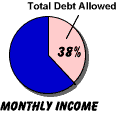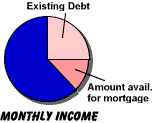This site is used as a homework reference in:
Stoughton High School (Pat Schneider's economics class)
|
|
|||||||||||||||||||||||||||||||||||||||||||||||||||||||||||||||||
The Debt RatioThe bank wants to be sure you can afford to
pay them back before they giv To calculate the debt ratio, just divide your debt by your income. For example, $1000 in monthly debt divided by $3000 in monthly income is a debt ratio of 33.3%. Your debt includes existing minimum payments on credit card and loan payments, as well as the mortgage payment you'd have if you get the loan, including taxes, insurance, and any mortgage insurance premium. Let's say that you make $3500/mo., and your bank allows a debt ratio up to 38%. That means your monthly debt can be as high as $3500 x 38% = $1330. If you're currently debt-free, then $1330/mo. is enough to buy a modest house. But if you already have some debt, there's not much room left for a mortgage payment, is there? Let's run some examples so you can see how having debt holds you back. In the first example you make $3500 a month and have no existing debt. Your mortgage payment would be $1300/mo., so your debt ratio would be $1300 ÷ $3500 = 37.1%, so if you bank allows a debt ratio of no more than 38% then you just squeaked in. Now let's look at a case in which you have some debt, since
most people do. In this example you have $4000 in
monthly income and $1000 in monthly debt. You'd think that
the amount you could borro Let's look at that again because it's important. With a bank limit of 38% for the debt ratio:
In both cases you have $3000 in free income after meeting
your existing debts, but in one case you can borrow only half
as much as the other. Is this fair? Not
really, but there's nothing you can do about the way the banks
operate. What you can do is to reduce your debt as
much as possible. Of course, the more you pay down your
debt, the less you have available for a down payment. So
should you or shouldn't you? Let's consider that
question.... "Should I use my cash to pay down my debt, or save the cash for my down payment?" This isn't always an easy question to answer, since the answer depends on lots of variables. But we'll try to provide some general guidelines. It will be helpful to calculate your debt ratio first, though.
Getting the largest payment possible As we saw, the upper limit for the debt ratio is 36 to 42%, depending on how generous the bank is. So how do you get towards the higher end of that range? You can often get a higher debt ratio when you put more money down on the house, and when your credit is good. The higher the down payment and the credit score, the higher the debt ratio the bank will allow. You can figure on 36-40% for less than 20% down, and 36-42% for 20% or more down. It's still a wide range because what the bank allows also depends on your credit score.
If you liked this site then you might like some of my other sites: Entire site ©1999-2023 Michael Bluejay Inc. • All information is "use at your own risk" Contact |
||||||||||||||||||||||||||||||||||||||||||||||||||||||||||||||||||

 e
you a loan. One way they consider your
ability to repay is by making sure your total debt doesn't
exceed a certain percentage of your income. This
percentage is called the debt ratio. If your debt
ratio is too high, no loan for you. In the most generous
case a bank will let you have a debt ratio of 42%, but they
might require a lower ratio for your particular case. The
pie chart at the right shows it in graphical form, if your bank
limits your debt ratio to 38%.
e
you a loan. One way they consider your
ability to repay is by making sure your total debt doesn't
exceed a certain percentage of your income. This
percentage is called the debt ratio. If your debt
ratio is too high, no loan for you. In the most generous
case a bank will let you have a debt ratio of 42%, but they
might require a lower ratio for your particular case. The
pie chart at the right shows it in graphical form, if your bank
limits your debt ratio to 38%. w
would be the same, since you still have $3000/mo. available for
your mortgage after your existing debt obligations. But
unfortunately it doesn't work out that way. Our total debt
would be the $1000 existing + $1300 for the mortgage, or
$2300. That makes your debt ratio $2300 ÷ $4000 =
57.5%. No way will you get a loan with a debt ratio that
high.
w
would be the same, since you still have $3000/mo. available for
your mortgage after your existing debt obligations. But
unfortunately it doesn't work out that way. Our total debt
would be the $1000 existing + $1300 for the mortgage, or
$2300. That makes your debt ratio $2300 ÷ $4000 =
57.5%. No way will you get a loan with a debt ratio that
high.